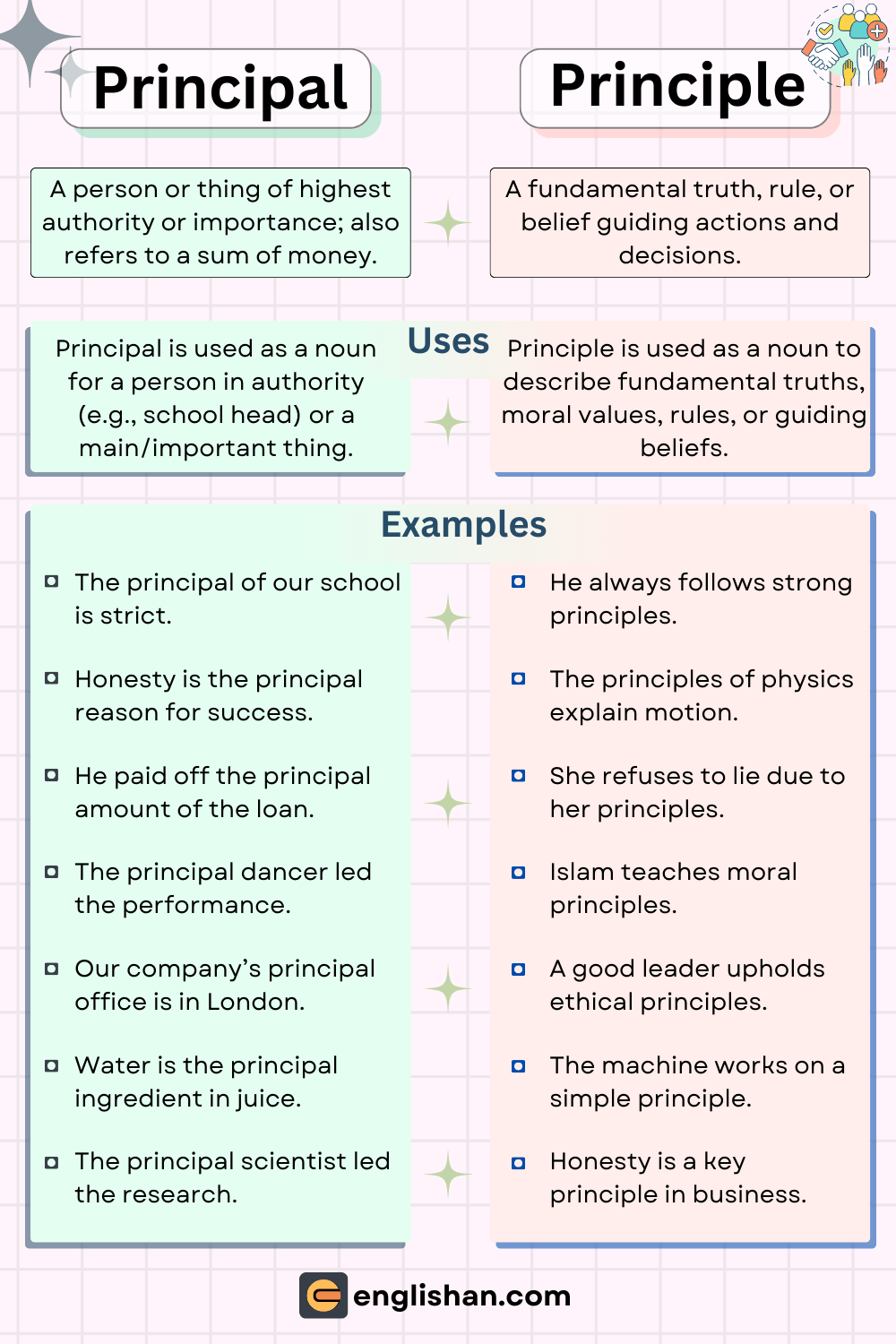Contents
Understanding the difference between principal and principle is essential for English learners. These words sound alike but have distinct meanings and uses, which often leads to confusion. In this article, we will learn the key differences, meanings, and usage of these words with clear explanations and examples. Enhance your English skills by exploring more confusing words in our Confused Words category.
Meanings of Principal and Principle
Principal: Refers to someone or something of the highest importance or authority. It can be a person, position, or an amount of money.
Principle: Refers to a fundamental truth, rule, or belief that guides actions and decisions. It relates to moral values or laws.

Differences Between Principal and Principle
| Aspect | Principal | Principle |
|---|---|---|
| Part of Speech | Noun, Adjective | Noun |
| Meaning | Main person, leader, or important amount | Moral rule, law, or fundamental belief |
| Usage | Refers to authority, finance, or importance | Refers to ethical or theoretical concepts |
| Examples | Principal of a school, principal amount | Principle of honesty, principle of gravity |
| Common Contexts | Education, business, leadership, finance | Philosophy, ethics, science, personal values |
Usage of Principal
- As a Noun (Referring to a Person in Authority)
Used to describe someone in a leadership role.
- The principal of the school, Mr. Ahmed, gave an inspiring speech.
- Fatima met with the principal to discuss her academic progress.
- As an Adjective (Meaning Main or Most Important)
Describes something of primary importance.
- The principal reason for the event’s success was good planning.
- The principal investor withdrew his support.
- In Finance (Referring to the Original Sum of Money)
Used in banking and loans to describe the initial amount before interest.
- She paid back the principal amount plus interest.
- The loan’s principal was reduced significantly over the years.
Usage of Principle
- Moral or Ethical Guideline
Refers to beliefs that guide behavior.
- Honesty is a principle that guides Amina’s decisions.
- Umar lived by the principle of fairness in all his dealings.
- Scientific Law or Fundamental Truth
Describes natural laws or universal truths.
- The principle of gravity explains why objects fall to the ground.
- The company operates on the principle of efficiency and sustainability.
- Personal Belief or Rule
Used to describe strong personal convictions.
- It’s against her principles to lie under any circumstance.
- Following the principle of kindness, Zain helped his neighbor.
Summary
The word principal refers to someone in authority, something of high importance, or an original sum of money. Principle, on the other hand, refers to a fundamental belief, rule, or truth. Although they sound alike, their meanings and uses are different.
FAQs
1. How can I remember the difference between principal and principle?
Think of “principal” as your “pal” — someone important, like a school principal. “Principle” ends with “-le” like “rule,” as it refers to rules or beliefs.
2. Can principal be used as an adjective?
Yes, principal can be an adjective meaning “most important,” like in “the principal reason for success.”
3. Is principle ever used to describe a person?
No, principle refers to beliefs or rules, not people. When referring to a person, use principal, like “the school principal.”
You May Also Like



